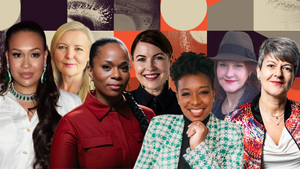As the UK Parliament’s Women And Women And Equalities Committee publishes the findings of its Misogyny In Music inquiry, representatives from across the industry comment on its damning contents and wide-ranging recommendations.
Read our coverage of the publication at the link below, and see the various responses in full in this article.
Misogyny remains “endemic” in “boys’ club” music industry says UK parliamentary report
UK Parliament’s Women And Equalities Committee has published a damning report on misogyny in the music industry. It found that harassment and abuse frequently go unreported, with some companies actively suppressing such claims, and makes numerous proposals for new legislation to tackle the issue

Vick Bain, Founder, The F-List:
"We at The F-List for Music are delighted to read this hard-hitting report; though it is bittersweet because it gives voice to a side of the music industry many wish to deny, discount, diminish or force into silence through the misuse of NDAs or threats of reputational damage.
This report makes us feel supported, listened to, and validated. As a woman who has worked in almost all areas of music for over 25 years, I have personally experienced many of the issues raised in the report.
And as a PhD researcher in women's careers in music over the last year I have heard the confidential testimony of 50 incredible women in music, and the vast majority of them have stories of discrimination, harassment, sexual abuse, unequal pay, precarious working environments, lack of support, and overbearing control over their careers manifested in many ways. And it is often the most under-represented groups, such as Black, Asian, trans and disabled women who struggle the most.
Even the ones who have not directly suffered, have been aware of others who have, which still has an impact on the whole culture. We call on government to enact the recommendations and the music industry to work with us in helping to make positive changes."
Rebecca Ferguson, Board Director, The Ivors Academy:
"I welcome the recommendations of the Women And Equalities Committee and I look forward to the urgent recommendations being materialised into something that women in music can feel confident about. The opportunity is now there for a safer music industry. The Women And Equalities Committee report has carved a very clear and thought out path to change. Alongside many other women, I look forward to the government's plan of action."
Dr Charisse Beaumont, CEO, Black Lives In Music:
"I'm deeply moved by the findings of the WEC Misogyny In Music Report. It validates our experiences, particularly those of Black women in the music industry. The data mirrors the challenges we face and amplifies our voices, calling for an industry where everyone, regardless of background, can flourish.
Black Lives In Music fully support the recommendation for the music industry to collaborate with Creative Industries Independent Standards Authority to tackle bullying, harassment and discrimination, and we eagerly anticipate the launch of our survey investigating bullying and harassment in the music industry next month.
We at Black Lives In Music are profoundly grateful to everyone who shared their experiences for the 'Being Black In The UK Music Industry' report. Your courageous voices were instrumental in the WEC Misogyny In Music inquiry and continue to form our strategy for industry wide change.
However, it is crucial that our voices not only be heard but also acted upon, the government expects the music industry to act on all of the recommendations in this report and so do the industry workforce and creators, particularly recommendations points 43 and 44 which are in our forthcoming Anti Racist Code Of Conduct. It's essential that together we foster an industry that is safe, respectful, and empowering for all."
Silvia Montello, CEO, the Association Of Independent Music:
"The Misogyny In Music report makes for uncomfortable but sadly unsurprising reading – given my 34 years in the industry I have witnessed, experienced and campaigned against the inequalities and discrimination sadly still faced by women in music.
And as one of the ‘relatively few’ women in the upper age bracket I can attest to the many challenges of navigating through and maintaining a successful music career and achieving a leadership position. It should not still be this hard, here in 2024, for women to be supported to succeed and to be taken as seriously as our male counterparts.
As the report points out, it is not enough to focus simply on increased numbers of women in our industry but to ensure that they are treated equally and paid equally - and our industry still has much work to do on both counts.
AIM welcomes the recommendations in the report which look to add extra safeguarding measures to protect women whatever their role, with more stringent training and certification for those who work with women to avoid abuse, harassment, sexual assault and bullying. We also welcome the recommendations to provide support for mothers, carers and freelancers."
Dr Jo Twist, CEO and YolanDa Brown, Chair, BPI:
"Misogyny In music and across society is completely unacceptable. This report contains some thoughtful recommendations and recognises that all parts of our industry have a shared responsibility to tackle this important issue head on.
We are already working with the wider music sector to build on the progress our label members are leading the way in making and in supporting the work of UK Music and the ongoing development of CIISA.
As the Committee acknowledges, record companies have increased representation of women in executive positions, and we’re seeing more women - as artists and in their teams - achieve success."
Annabella Coldrick, CEO, Music Managers Forum:
"The MMF contributed to and welcomed the Women And Equalities Committee's inquiry into the issue of Misogyny In Music. We look forward to discussing these recommendations with our members and other industry partners including the Creative Industries Independent Standards Authority.
As an organisation, we are proud of the depth and diversity of our 1,500 strong membership, including our representation of female managers (41%). The MMF wants all managers to develop their careers to the highest professional standard as outlined in our Code of Practice and would urge artists and industry to encourage any new managers to sign up.
The MMF is also a founding member of CIISA, who are referenced in our Code, and we support a concerted drive to raise standards and to eradicate discrimination for all who work in music."
Noami Pohl, General Secretary, Musicians’ Union:
"We’re all too aware of the issues regarding misogyny in the music industry – it’s one of the reasons why the MU set up its Safe Space scheme a few years back. Safe Space provides an opportunity for musicians to share instances of sexism, sexual harassment and sexual abuse in the music industry.
A recent MU survey revealed that 48% of musicians have been sexually harassed at work and 85% did not report it. 61% also believed freelancers are at higher risk of being sexually harassed while working.
We want to build up a picture of the problems that exist and seek long term solutions. We are campaigning for laws to protect musicians at work and are on a mission to create cultural change within the music industry."
Deborah Annett, CEO, Independent Society of Musicians:
"The ISM thanks the members of the Women And Equalities Committee for listening so carefully to the evidence which so many gave their Committee.
We are extremely grateful for all their hard work and for the resulting comprehensive and robust Misogyny In Music report which so graphically portrays the discrimination and harassment which women and others have been subjected to in the music sector for many years. In the face on this groundbreaking report we call on both Government and the music sector to act.
Many of the Committee’s recommendations and changes mirror those which the ISM has been campaigning on for years. The Committee is right to have identified the legislative reforms required, such as amending the Equality Act and legislating properly to prevent third party harassment.
We hope the publication of the Misogyny In Music report is the moment of real and lasting change in the music industry, it’s what women desperately need because as the report correctly identifies, women in music have had their lives ruined and careers destroyed – this must stop. Less than a year ago Minister for Equalities Kemi Badenoch was told of the issues in music by ourselves and many others. The Minister did nothing. Now it is time for her to act."
Tom Kiehl, Interim CEO, UK Music:
"There must be zero tolerance for misogyny and all forms of discrimination in the music industry, which is working hard to tackle these issues.
We recognise there is still more to do, that misogyny continues to exist and we are striving to bring about positive changes. We are working right across the sector to ensure the music industry is an inclusive place for everyone to work.
Our unrelenting drive for change will continue as we tackle misogyny by calling it out and changing practices that disadvantage or hinder women.
We will continue to make further changes by ensuring equality of pay and promotion, gender balance, and boosting transparency over pay and conditions.
This will build on UK Music and its Diversity Taskforce's Ten Point Plan and 5 P's initiatives, the principles of which are echoed in the report.
This report rightly recognises the freelance nature of the music industry, where many are self-employed. We are pleased to see that the report recommends to government that they introduce protections for freelance creatives that we have sought in our recent manifesto.
We will continue our work with the Government to drive out misogyny, bullying, abuse and harassment to ensure the UK music business is a welcoming place for women to work and pursue a career.
We will also continue to engage with the development of the Creative Industries Independent Standards Authority (and other proposals to ensure working our sector is a positive experience for all."


